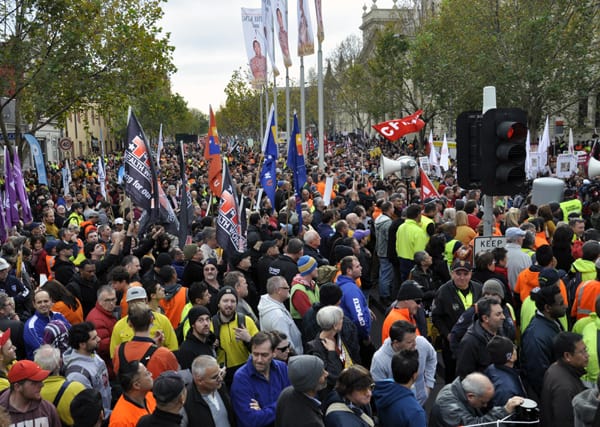Abbott’s budget is the most unpopular in a generation, with greater public opposition even than the horror budget John Howard delivered straight after his election in 1996.
The Liberals have utterly failed to convince people about the need for cuts. Their “deficit crisis” is widely seen as a fraud.
The Senate could easily block the whole budget and force a new election. But both Labor leader Bill Shorten and The Greens’ Christine Milne have dismissed this idea. The Greens are even considering passing the increase in petrol tax. They are both too committed to playing the parliamentary game and to ensuring stability for big business.
But the Senate, even after Clive Palmer takes the balance of power in July, could still block some of the worst individual measures in the budget. The more anger explodes onto the streets the more pressure will be on the Senators to stick to their guns and stop Abbott’s attacks.
The fact that the unions have started to mobilise is a major step forward. Melbourne has led the way, with at least 20,000 joining a weekday rally on 12 June. Construction workers, among others, walked out on strike to attend.
Unions in Melbourne and Sydney have called another day of action on Sunday 6 July. Union members and all other activists need to do everything we can to make sure these are the biggest demonstrations against the budget yet.
We need to take material into every suburb, workplace and classroom to make sure that everyone who hates Abbott’s budget knows this is the place to be.
If there are large organised union contingents this can be a springboard to further union stopwork action.
But large weekend demonstrations will not be enough on their own to stop Abbott. We need a repeat of the early period of the Your Rights at Work campaign, when the unions organised mass week-day rallies against WorkChoices. These saw workers take strike action in their tens of thousands against the last Liberal government. In late 2005 around 200,000 people in Melbourne and 30,000 in Sydney (as well as others across other Sydney venues) joined the largest of the days of action.
Abbott is ruling for big business and the rich. His budget is widely seen as unfair, with workers and the poor hit hardest. The blueprint for his budget agenda was drawn up by the Business Council of Australia, big business’ peak lobby group, in the government’s Commission of Audit. Strike action hits business where it hurts, cutting off their profits and potentially costing them millions.
Ongoing strikes can shut down the country and create the kind of political crisis that could bring Abbott to heel.
Union leaders
It’s clear that union leaders will not agree to organise further stopwork action unless there is serious pressure to do so from union members and the wider working class.
In Sydney union leaders tried to brush aside any discussion of industrial action against the budget at the delegates meeting held on the same day as Melbourne’s rally.
Instead of trying to stop Abbott’s budget attacks before he can implement them, the ACTU is simply hoping the worst attacks get blocked in the Senate, and waiting for the next election in two and half years’ time to vote Abbott out.
But if we fail to mobilise the anger when it exists now to deal Abbott a fatal blow, it leaves him plenty of time to recover before the election. When the unions wound down the fight against John Howard during his first term, he was able to stage a comeback and went on to win the next three elections.
And even if Abbott is booted out, the ACTU strategy would mean a repeat of what happened at the end of the Rights at Work campaign back in 2007. This saw the union leaders wind down the mass demonstrations in order to focus on an electoral campaign in marginal seats. When Labor was elected, Kevin Rudd and then Julia Gillard were able to thumb their noses at the unions and all those who voted for them, and carry on with a watered down version of the Liberals’ agenda of cuts, attacks on workers’ rights and neo-liberalism.
Beneath its fighting rhetoric against Abbott, Labor continues to agree with idea the some budget cuts are necessary. Just a year ago, it was a Labor government that forced through cuts to single parents’ payments and universities. Unless we build a stronger movement and stronger unions able to fight for change, re-electing Labor will change little.
Large, angry demonstrations on 6 July can help to build the pressure for further action. We also need an avalanche of motions at union meetings and signatures on the open letters pressing for union strike action. It’s time to build the fightback.






